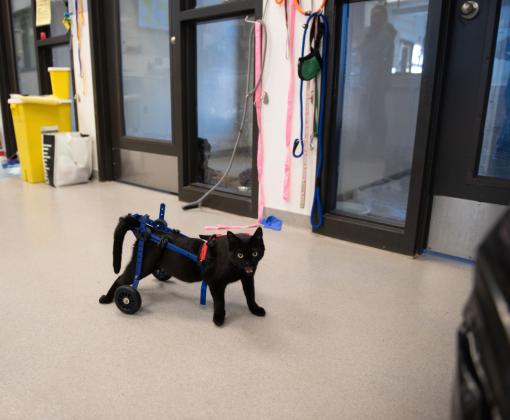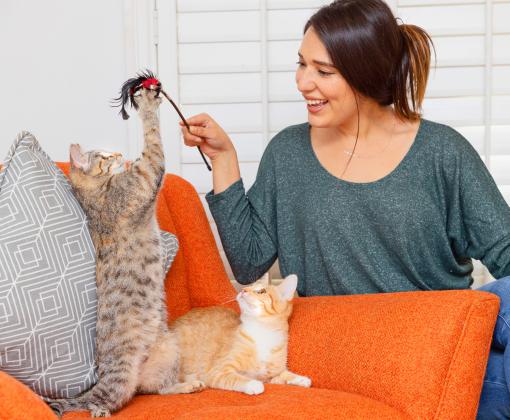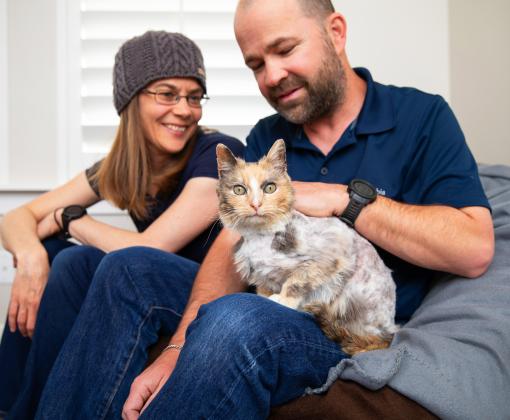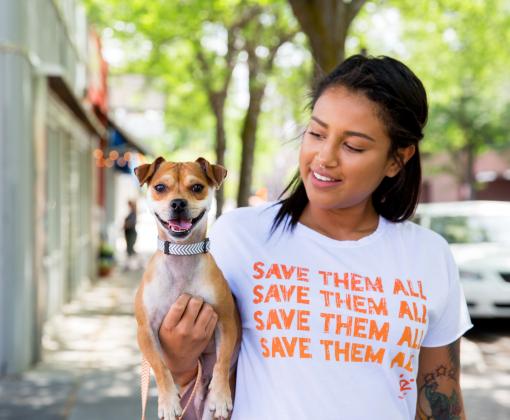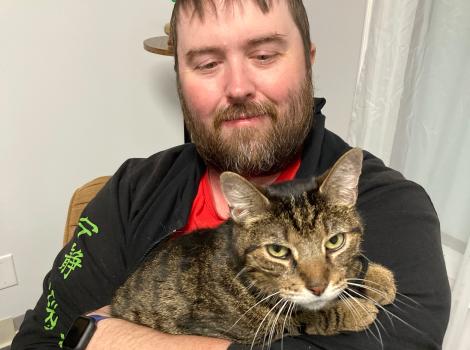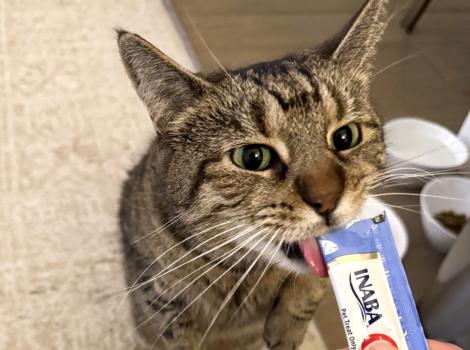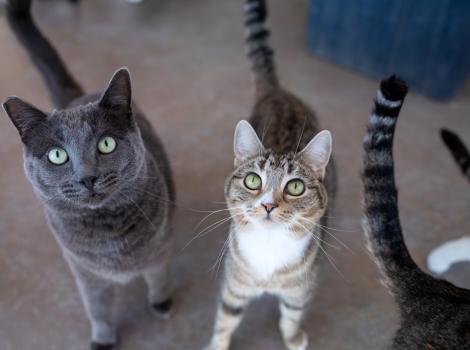Faces of No-Kill: Kitty gets kicking with care and a cart
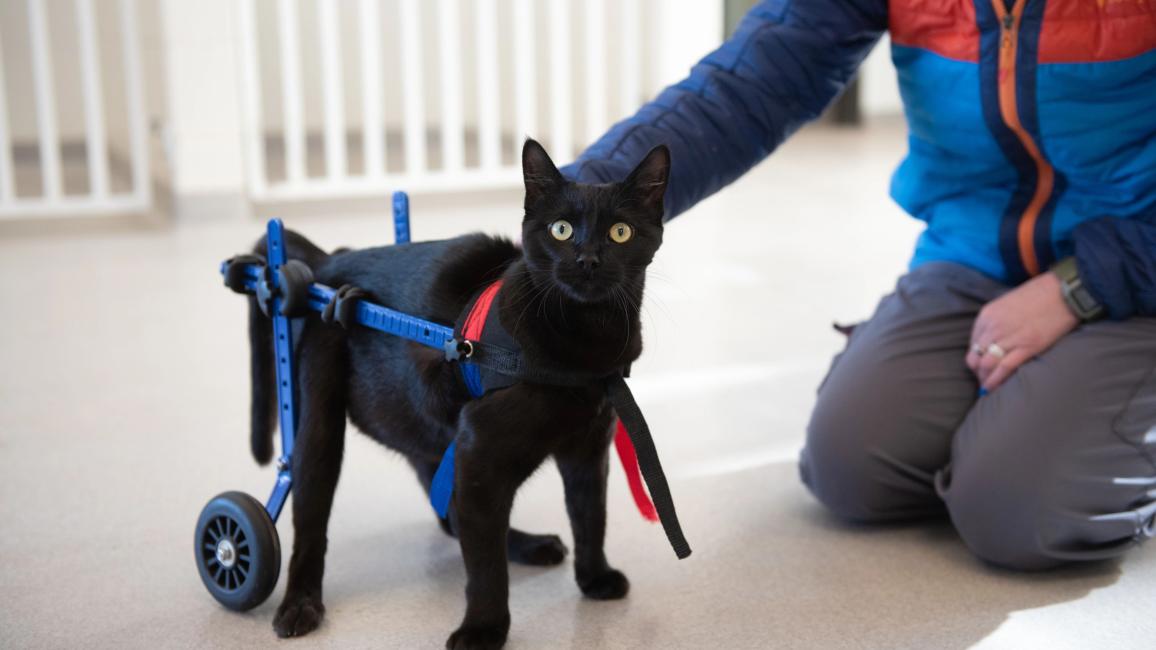
A cat’s twitching tail can tell you a lot about how they’re feeling. A steady swish could mean they’re a mite irritated or particularly playful. A lazy loop could indicate they’re content and at peace. For Miles, on the other hand, a strong tail reaction most likely means he’s in acupuncture — and it’s definitely a good sign.
This story is a part of our Faces of No-Kill series, highlighting the journey of pets who lost their place to call home. These pets are thriving today thanks to animal shelters that said yes to lifesaving with a community that found a way to save them. Best Friends’ goal is for every shelter and every community to reach no-kill, and this story shows why that’s so important.
At just 2 months old, Miles had been spotted by a good Samaritan on the side of the road, clearly in need of help. He was dragging his hind end, pulling himself along with only his front paws, and he was completely alone. Concerned about his condition and safety, the person who found him quickly scooped him up and reached out to the nearby clinic at Best Friends Animal Sanctuary. And soon, the fragile feline was on his way to get all the TLC he needed.
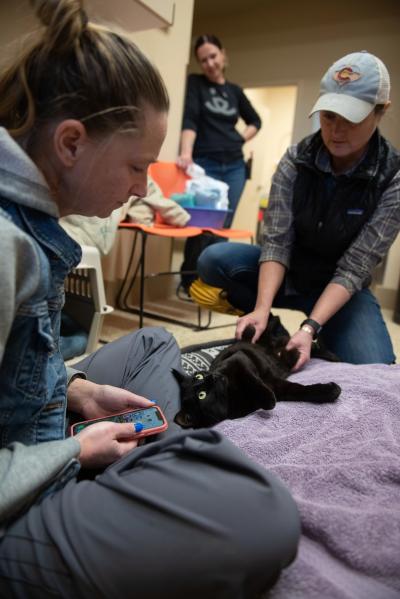
Getting safe and settled in
The moment Miles arrived at Best Friends Animal Clinic, veterinary staff welcomed him in and got to work figuring out how best to help the little kitten. It was a positive sign that Miles still had feeling in his back end. He would pull his feet away when veterinarians carefully pinched his toes, and he reacted to being petted. He just couldn’t stand up.
Veterinarians also found no break in his spine when they X-rayed him, which meant some sort of nerve and tissue trauma was likely the cause of his partial paralysis. While Miles’ condition meant he couldn’t use the litter box on his own and needed human help to express his bladder and bowels, altogether things looked hopeful. With physical therapy, there was a chance Miles could regain some ability to walk.
[Paralyzed cat gets moving again]
It would all still be a bit of a journey though. So to make sure Miles was as comfortable as possible (and to keep a close eye on the kitten), he went into foster care with Best Friends vet tech Sarah Breeze. “I’ve always been drawn to animals with special needs,” Sarah explains. “I didn’t have any other foster pets, and I don’t have any pets right now. So I had the ability to do it, and I thought he would need a little bit more attention.”
Though Miles had been a bit shy with all the new people around him at the clinic, it didn’t take very long for him to get settled in to Sarah’s space. And he proved to be an extra-energetic kitten, not letting his back legs slow him down for a second.
“He’s very active at night especially,” Sarah says with a laugh. “When I’m home from work, that’s when he wants to play.” Miles zoomed around their shared bedroom at top speed, chasing toys and tumbling around and stopping, very occasionally, for an ear scratch or quick snuggle. And while he was perfectly capable of climbing up next to Sarah when she went to bed, the lights going off just meant it was time for his own solo adventures.
Safe and settled in, Miles was already beginning to blossom. And for physical therapy, he was a superstar.
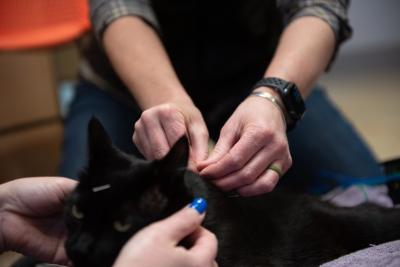
Kitten gets kickin’
Miles’ therapy routine began with electro-acupuncture once a week. Once he’s been made comfortable with a soft cushion and pile of blankets, veterinarian Dr. Tara Timpson sets to work delicately placing needles to soothe and stimulate Miles’ nerves. Most of the time, Miles snoozes through his appointment and enjoys Sarah’s scratching around his face while Dr. Tara’s hands smooth over his black fur. Sometimes, he feels a little wild and playful and doesn’t want to sit still. But there’s no question the therapy has been helping.
“Mid-back, little ankles,” Dr. Tara begins listing where she places the acupuncture needles, then laughs. “I try to do this one at the base of the paw pad, but he’s getting so much more feeling that it’s really hard for me to get that one.” When Miles first began treatment, she says, he didn’t have much reaction to the needles at all. But now, Miles shakes his foot and pulls it away quickly. It’s an excellent improvement, even if it does sometimes mean one fewer acupoint. His tail, too, has started joining in, flicking back and forth widely with the stimulation.
[Paralyzed cat has sweet spirit that can’t be stopped]
After an acupuncture session, Dr. Tara stretches and moves Miles’ back legs and helps him rotate his hips a bit to limber him up and get his muscles moving. Meanwhile, Miles purrs and rolls happily onto his back, reaching his front paws out to Sarah. For him, an acupuncture appointment is a pretty great way to have everyone’s undivided attention.
In their day-to-day life, Sarah continues the stretching and toe-massaging treatment and makes sure to strap Miles into his cart for some exercise time each day. While Miles can get around just fine without the cart (and he’s certainly more nimble and able to get around and under things without it), daily time in it helps strengthen his core. In a full standing position, with his rear supported, Miles even kicks his legs in wobbling steps sometimes. Plus, Dr. Tara notes, on days when he’s just had his cart time before acupuncture, she sees way more movement from him during his appointment.
So that’s the plan: More time in his cart each day will help Miles get even stronger, while acupuncture will continue to get his nerves firing. And then, hopefully, he will have even more mobility for nocturnal shenanigans and charging through his home after he gets adopted.
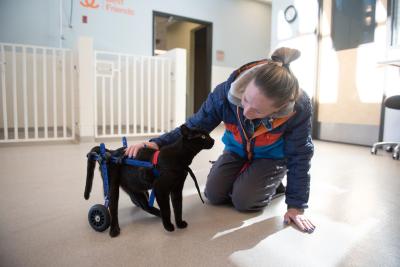
Let's make every shelter and every community no-kill by 2025
Our goal at Best Friends is to support all animal shelters in the U.S. in reaching no-kill by 2025. No-kill means saving every dog and cat in a shelter who can be saved, accounting for community safety and good quality of life for pets.
Shelter staff can’t do it alone. Saving animals in shelters is everyone’s responsibility, and it takes support and participation from the community. No-kill is possible when we work together thoughtfully, honestly, and collaboratively.
